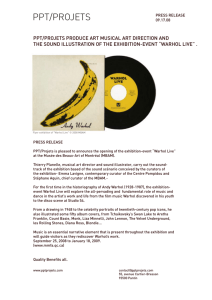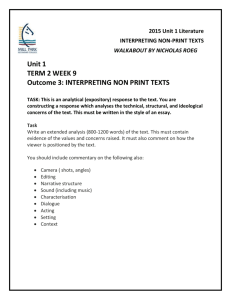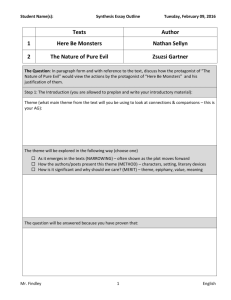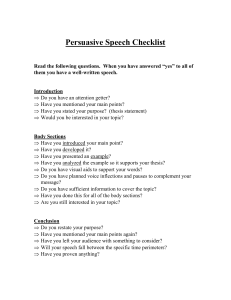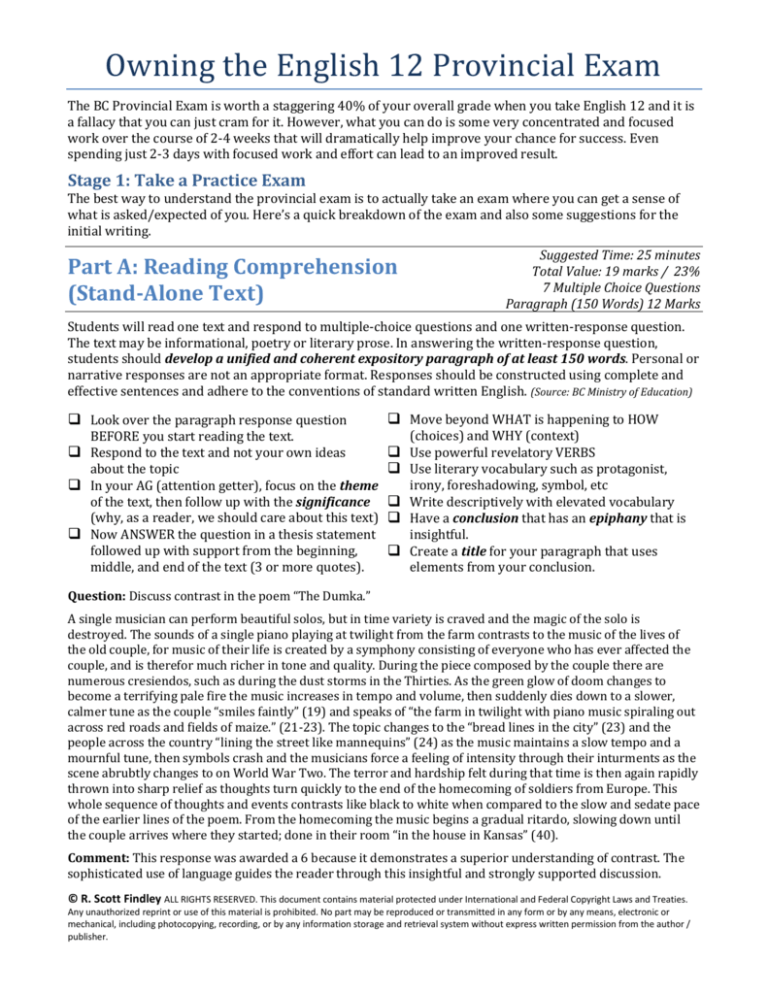
Owning the English 12 Provincial Exam
The BC Provincial Exam is worth a staggering 40% of your overall grade when you take English 12 and it is
a fallacy that you can just cram for it. However, what you can do is some very concentrated and focused
work over the course of 2-4 weeks that will dramatically help improve your chance for success. Even
spending just 2-3 days with focused work and effort can lead to an improved result.
Stage 1: Take a Practice Exam
The best way to understand the provincial exam is to actually take an exam where you can get a sense of
what is asked/expected of you. Here’s a quick breakdown of the exam and also some suggestions for the
initial writing.
Part A: Reading Comprehension
(Stand-Alone Text)
Suggested Time: 25 minutes
Total Value: 19 marks / 23%
7 Multiple Choice Questions
Paragraph (150 Words) 12 Marks
Students will read one text and respond to multiple-choice questions and one written-response question.
The text may be informational, poetry or literary prose. In answering the written-response question,
students should develop a unified and coherent expository paragraph of at least 150 words. Personal or
narrative responses are not an appropriate format. Responses should be constructed using complete and
effective sentences and adhere to the conventions of standard written English. (Source: BC Ministry of Education)
Look over the paragraph response question
BEFORE you start reading the text.
Respond to the text and not your own ideas
about the topic
In your AG (attention getter), focus on the theme
of the text, then follow up with the significance
(why, as a reader, we should care about this text)
Now ANSWER the question in a thesis statement
followed up with support from the beginning,
middle, and end of the text (3 or more quotes).
Move beyond WHAT is happening to HOW
(choices) and WHY (context)
Use powerful revelatory VERBS
Use literary vocabulary such as protagonist,
irony, foreshadowing, symbol, etc
Write descriptively with elevated vocabulary
Have a conclusion that has an epiphany that is
insightful.
Create a title for your paragraph that uses
elements from your conclusion.
Question: Discuss contrast in the poem “The Dumka.”
A single musician can perform beautiful solos, but in time variety is craved and the magic of the solo is
destroyed. The sounds of a single piano playing at twilight from the farm contrasts to the music of the lives of
the old couple, for music of their life is created by a symphony consisting of everyone who has ever affected the
couple, and is therefor much richer in tone and quality. During the piece composed by the couple there are
numerous cresiendos, such as during the dust storms in the Thirties. As the green glow of doom changes to
become a terrifying pale fire the music increases in tempo and volume, then suddenly dies down to a slower,
calmer tune as the couple “smiles faintly” (19) and speaks of “the farm in twilight with piano music spiraling out
across red roads and fields of maize.” (21-23). The topic changes to the “bread lines in the city” (23) and the
people across the country “lining the street like mannequins” (24) as the music maintains a slow tempo and a
mournful tune, then symbols crash and the musicians force a feeling of intensity through their inturments as the
scene abrubtly changes to on World War Two. The terror and hardship felt during that time is then again rapidly
thrown into sharp relief as thoughts turn quickly to the end of the homecoming of soldiers from Europe. This
whole sequence of thoughts and events contrasts like black to white when compared to the slow and sedate pace
of the earlier lines of the poem. From the homecoming the music begins a gradual ritardo, slowing down until
the couple arrives where they started; done in their room “in the house in Kansas” (40).
Comment: This response was awarded a 6 because it demonstrates a superior understanding of contrast. The
sophisticated use of language guides the reader through this insightful and strongly supported discussion.
© R. Scott Findley ALL RIGHTS RESERVED. This document contains material protected under International and Federal Copyright Laws and Treaties.
Any unauthorized reprint or use of this material is prohibited. No part may be reproduced or transmitted in any form or by any means, electronic or
mechanical, including photocopying, recording, or by any information storage and retrieval system without express written permission from the author /
publisher.
Part B: Reading Comprehension
(Synthesis Text 1 & 2)
Suggested Time: 25 minutes
Total Value: 14 marks / 17%
14 Multiple Choice Questions
Students will read two texts and respond to multiple-choice questions on both. The texts may be
informational, poetry or literary prose. 7 mutiple choice questions for each text.
Look over the synthesis response question and
While reading the texts, start highlighting parts
the two comparison multiple choice questions
BEFORE you start reading the texts.
that will help you with the written response
If response question is about one
narrator/authors perspective on the other, read
that text first, regardless of the order on the
exam
Suggested Time: 35 minutes
Total Value: 26 marks / 30%
2 Multiple Choice Questions
Essay (300 Words) 24 Marks
Part C: Analysis of
Synthesis Texts 1 & 2
Students will respond to two multiple-choice questions and one written-response question based on
Synthesis Texts 1 and 2. In answering the written-response synthesis question, students must use the
format of a multi-paragraph expository essay of at least 300 words. The quality of that response, not its
format is paramount. Personal or narrative responses are not an appropriate format. Students should be
able to write on-topic and present a well-organized response. Students should note that lengthier
responses are not necessarily superior to shorter, more focused responses. Students should be able to
support a position or interpretation by citing specific details, features and information from the texts.
They should be able to generate and shape their ideas using varied sentences and an appropriate level
of diction. They should also demonstrate an understanding of the conventions of standard written English
by monitoring their spelling, grammar, punctuation and syntax. (Source: BC Ministry of Education)
Look over the synthesis response question
BEFORE you start reading the texts.
Focus on the BIG ideas that bridge the texts.
4 paragraph (intro, 1-2 significant body
paragraphs with convergent & divergent aspects,
meaningful conclusion)
Use TAG TIQs CE (Title, Attention Getter, Thesis,
Integrated Quotes for Support, Conclusion,
Epiphany)
In your AG (attention getter), focus on the theme
of the texts, then follow up with the significance
(why, as a reader, we should care about this text)
that is complex, paradoxical, or ironic.
Now ANSWER the question in a divided thesis
2 of 8
statement that mentions both texts and authors
followed up with a transitional statement.
Find points of convergence/divergence
Move beyond WHAT is happening to HOW
(choices) and WHY (context)
Use powerful revelatory VERBS.
Use literary vocabulary such as protagonist,
irony, foreshadowing, symbol, etc
Write descriptively with elevated vocabulary
Have a conclusion that has an epiphany that is
insightful.
Create a title for your essay that uses elements
from your conclusion and epiphany.
©R. Scott Findley
Question: Discuss the ways in which Hap, the dairy farmer in “The Soul of Capitalism,” would likely
respond to Warhol’s art as described in “When Canada Met Andy.” You must refer to both passages in your
essay.
The qualifications for art are very subjective. What one individual may call beautiful or a profound critique
on modern society another may completely disregard. Andy Warhol, who has come to be considered “as
one of the 20th century’s major artistic innovators” (8-7), was not initially received with as much respect
and admiration. The general opinion initially given to Warhol’s art is likely similar to the opinion Hap, the
dairy farmer in “The soul of Capitalism,” would have held.
Although Hap is described as an “art lover” (1), his appreciation for art tends towards the “traditional kind”
(1). Warhol’s art is far from being considered traditional. As a pioneer of the pop art movement his work
broke many conventions and would have been a bold contrast to the “host [of] several paintings and
prints,” (2) most of which were landscapes, that Hap and his wife Edna displayed. “As far as [Hap] is
concerned, it’s not art if he can’t tell what it is.” This approach to art is very similar to the approach taken
by Canadian customs towards Warhol’s art. The men at customs were unable to tell a “Warhol box
sculpture from the real thing, a [...] commercial product” (5). The initial opinion of Warhol’s work held by
Charles Comfort, the director of the National Gallery of Canada, was that he didn’t classify the “processed
cartons and tin cans as sculpture” (6). It is likely Hap would have held the same opinion. His response to
the government’s $2 million purchase of a painted red stripe was one of astonishment. His ability to “tell
what it was” (2) still caused him to call “it something other than art” (2).
As the world’s stance on Warhol’s art changed though it is possible so too would Hap’s. Warhol is
now considered a “major artistic innovator [ ] and [one of the] most influential artists” (8). The successor to
Comfort purchased “eight of Warhol’s Brillo Box sculptures” (8). Although initially unsellable, “nearly fourand-a-half decades later, the same canveses are worth millions” (Figure 4). Hap’s opinion of Warhol’s work
might be elevated over time. Although he might have initially “gazed open-mouthed” (30) as Warhol’s work
became mainstream and in-depth analysis were presented his opinion might have changed. His reaction to
Axel’s sculpture is bewilderment but he does resolve that he doesn’t “really know much about modern art”
(32).
Although the initial opinion given to Warhol’s work is likely similar to the opinion Hap, the dairy farmer in
“The Sol of Capitalism,” would have held it is possible that as Warhol’s work moved out of the fringe and
modern art labels Hap’s position might have softened. Warhol has come to be considered one of the most
important and influential figures in art. The qualifications for art are very subjective. What one may
consider beautiful or significant another may disregard. As history has shown though, opinions change.
Comment: This paper is a 6. This insightful and engaging discussion is an excellent example of synthesis.
The student is able to refer to each work in each of the body paragraphs in a way that directly answers the
question. The thematic opening and conclusion sentences are effective. It is important to note that, as this is
a first draft, some minor errors exist.
3 of 8
©R. Scott Findley
Suggested Time: 35 minutes
Total Value: 24 marks / 30%
Essay (300 Words) 24 Marks
Part D: Composition
Students should be able to demonstrate the skills of written expression such as organizing ideas, using
effective transitions within and between sentences and paragraphs, constructing effective sentences,
and using conventions of standard written English. In writing a multi-paragraph original composition of
at least 300 words, students should be able to limit the topic, decide on their purpose and audience and
present a thesis statement or controlling idea as appropriate. Students should be able to maintain a focus
on the topic while developing ideas to support their thesis or controlling idea. Students should be able
to generate and shape their ideas using varied sentences and an appropriate level of diction. They
should also demonstrate an understanding of the conventions of standard written English by monitoring
their spelling, grammar, punctuation and syntax. Students will be provided with one topic for response.
(Source: BC Ministry of Education)
Look over the composition prompt before you
Have a conclusion that has an epiphany that is
even start the exam
Choose between personal narrative, expository,
or fiction; you can’t write a poem, recipe, or list.
Use the inverted pyramid to narrow the prompt.
The prompt cannot be your thesis
Spend at least 10 minutes sorting out your ideas.
Your thesis needs not be explicitly stated but
must be implicit.
SHOW: Don’t Tell.
Aim for fresh, creative, and original ideas.
Even though it is a composition, you MUST still
have a THESIS (the aspect that you are trying to
prove)
Still use TAG TIQs CE (Title, Attention Getter,
Thesis, Integrated Specific Support, Conclusion,
Epiphany)
Use powerful revelatory VERBS
Use literary vocabulary such as protagonist,
irony, foreshadowing, symbol, etc
Write descriptively with elevated vocabulary
4 of 8
insightful.
Create a title for your essay that uses elements
from your conclusion and epiphany.
Narrative: consider having a few canned
personal narratives that you can use with a
suitable prompt.
Narrative: start with action or dialogue
Narrative: your thesis will be how you GREW as
a result of the experience.
Narrative: play with your timeline for dramatic
effect.
Narrative: make emotion the heart of your story.
Expository: avoid obvious or cliché ideas
Expository: avoid controversial or preachy ideas.
Expository: reference current events, history, or
literature to add richness.
Expository: give specific examples and details
Expository: start with an extended metaphor or
an inventive hook.
©R. Scott Findley
Topic: Positive connections with older generations can enrich our lives.
The gruff voice, the vanilla flavoured cigar smoke, the laugh always resulting in a hacking cough, these were
the distinct memories of my grandfather. Perhaps what best described him was the vanilla flavour, plain
and simple, exactly how he lived his life and interacted with everyone. I guess being born during a time of
war will harden anyone’s emotions but was a joke, a giggle or a smile really that hard to ask for? And this
was all before the cancer hit, attaching itself to his left like a lion to its prey. No matter how strong and
sturdy he may have ached this was not a battle he was going to win via a stern look or raising of his voice.
No matter how well I did in school or how many sports teams I captained he never once acknowledged my
accomplishments. The one true thing in which he showed compassion for was football.
“There’s nothing like giving up your heart and soul on every play and thento get right back up and it again”
he told me once.
This was perhaps the sole reason why I tried out my junior year, making the team and eventually winning
Most Valuable Player honours. Once again I received little recognition from him. The severity of the cancer
grew by the day, and already viotile cough turned into a gut wrenching ordeal lasting minutes on end. I
developed a deep sense of pity towards him although showing anything of the sort to his face was met with
a swift “whatcha looking at kid.”
As his days dwindled down my visits to the hospital increased, many times not even seeing him, merely to
help my grandmother cope or drive other family members. His body mass dwindled as well, strong sturdy
muscles giving way to useless fat and eventually skin and bones. He was now but a fragment of himself.
Football, the one thing we shared, the one bond we had, was nearing the completion of its season. Thus the
Super Bowl was upon us, an event my grandfather hadn’t missed in his lifetime. However this one, the
nurses told him, was one he would have to miss. The dingy hospital of our small town did not provide the
simple convenience of working lights let alone a television restricting any hope of him watching the game.
This, I knew, was the last straw for my grandfather and he delved into deep depression knowing his end
was soon. I also knew I couldn’t let this happen and immediately brought my laptop to his room the day of
the big game and set up it up so he could watch his beloved sport one last time. There was no thank you or
even a nod throughout the game until the last seconds ticked away on the game clock. As I looked over to
my dying grandfather I saw a man overcome with emotions. A small tear running down his face he croaked
“I’m so proud of you.” And that’s all I ever needed.
Comment: This response was awarded a 6 because of its maturity of style. The reader is engaged by its
strong voice; furthermore, the ending is subtle, yet powerful.
5 of 8
©R. Scott Findley
Stage 2: Review Your Exam Results
After your exam has been submitted for marking (if you do it electronically, you can print out the results
and ask your English teacher to mark the written portions), you want to do a targeted check on what you
got right and also wrong. This will help you make active decisions about what to improve for your next
practice exam.
Review and check over each of your multiple choice answers to understand WHY you got it
wrong and to learn from your mistakes. If you look at the Answer Key for the exam, you can also
discover if there is a pattern for the questions you are getting wrong based on the Cognitive Process.
Are you using strategies such TAG TIQs CE (Title, Attention Getter, Thesis, Integrated Quotes for
Support, Conclusion, Epiphany)? First impressions still matter, even in writing, so adding touches
such as a title, a strong conclusion with an epiphany can be those details that push your writing to a
higher mark.
Are you using State/Quote/Clarify? It is essential when writing about literature that you make a
strong statement that is connected to your thesis that is then immediately followed up with a direct
reference to the literature.
Often the best moments in life are not the eventful ones, but instead those where honest enjoyment is
experienced in the company of those whom we love. The maternal speaker in Barbara Crooker’s poem
“Ordinary Life” offers a silent supplication for her “unexpected gift” of a “day of grace” where ironically
“nothing happened” during an average day with her family is indicative of the serenity that can
discovered in life’s simple pleasures. (35, 31, 1).
Reread what you wrote aloud and do you see/hear errors? Often in the heat of the
moment when writing, we leave out words that our brain fills in for us. When you look over
what you wrote, are there errors that you now see?
Cross out the two distractors for Multiple Choice. By using either your fingers, or even post-it notes
with the digital exam, you can then focus on the two options and decide which ONE is MORE CORRECT.
6 of 8
©R. Scott Findley
Did you truly synthesize on the Synthesis Essay? Often students write about one text in a
paragraph and then the other text in a subsequent paragraph. Instead, organize your response
into IDEAS not texts and focus on points of convergence (same idea, same approach) or
divergence (same idea, different approach).
Consider some Canned Compositions. Many of the prompts for the exam can be covered by
having several personal narrative stories that can be tweaked and modified to apply to the
prompt. Stories that involve growing up/growth, maturity/loss of innocence, a shift of
perspective, memories, importance of relationships, or that bad things happen are all strong
contenders and can often apply to the composition prompts. If you consider the prompts
below, what might be some personal experiences that you have had that could be used to apply
to some or all of them?
o
o
o
o
o
Each generation has something valuable to offer.
Happiness can be found in unlikely circumstances
Differing points of view make life interesting.
A person’s view of the world may change over time.
Our experiences can influence behavior.
o Your first date when you did everything wrong and only realized it when it was already
too late.
o Making cookies with your grandmother and you dropped the bowl and it broke.
o The death of your first pet.
o Discovering that your parent once did something amazing, but never told you about it.
Stage 3: Take 2-3 more Practice Exams
After reviewing all the previous tips and all those below, write more practice exams. Even if they cannot be
marked by a teacher, the more practice you have the better you will do. However, after each exam that you
write, take the time to go through the steps in Stage 2 again to ensure you are following all the advice. You
should see a gradual but steady increase in your mark both with the multiple choice and also with your
writing.
Stage 4: Final Tips & What to Do the Evening Before & Morning of the Exam
After reviewing all the previous tips and all those below, write more practice exams. Even if they cannot be
marked by a teacher, the more practice you have the better you will do. However, after each exam that you
write, take the time to go through the steps in Stage 2 again to ensure you are following all the advice. You
should see a gradual but steady increase in your mark both with the multiple choice and also with your
writing.
If it’s a poem, read it two or three times.
Be specific in your writing
Do not write a summary
Read your work quietly aloud to check errors.
Put titles in “Quotation Marks” for poems,
stories, and articles.
Do not assume the writer is the speaker within a
poem/prose.
Make sure your analysis deals with the whole
reading.
7 of 8
©R. Scott Findley
Notes
8 of 8
©R. Scott Findley


